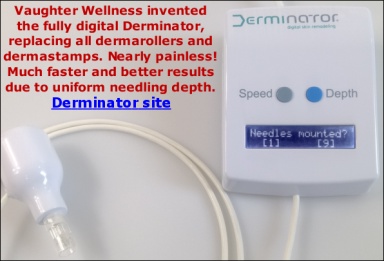It depends on the cause of your hyperpigmentation - whether it is an inflammation or a localized overproduction of melanin. Melanin is the pigment responsible for our skin color. Albinos have no or almost no melanin. When we expose the skin to the sun, our skin reacts/protects itself by producing more melanin and our skin darkens. Melanin absorbs the UV radiation and transforms it into harmless heat.
When melanin production is for some reason uneven, we end up with hypo- or hyperpigmentation caused by uneven distribution of melanin in our skin. That can happen when our skin is for example injured (such as after laser treatment) and we expose the unprotected skin to the sun before being completely healed. That is why you must protect your skin from the sun after deep dermarolling. I'm constantly “fighting” with people who refuse to avoid the sun even for one day after deep dermarolling..
Freckles are also localized melanin.
Unfortunately, inflammation (which is an immune protective response in order to fix the injury) can trigger the production of melanin even without sun exposure. Certain products or inflammation can stimulate melanin production in susceptible individuals. It is more common in dark skinned individuals. It is called postinflammatory hyperpigmentation. Melanin can either appear in the epidermis or the dermis (deeper in the skin).
Hydroquinone is a tyrosinase inhibitor. Tyrosinase is the enzyme that converts tyrosine to melanin. Hydroquinone thus lightens dark skin or lightens hyperpigmentations caused by melanin. If the hyperpigmentation is not caused by melanin, hydroquinone will not have effect on it.
Unfortunately there are issues with hydroquinone. As far as I know it is banned in Europe and only low-percentage hydroquinone is sold over the counter in the US.
There were some issues with its potential carcinogenicity with long term use. Low percentages available OTC are approved by the FDA so it should be OK.
Furthermore, in some individuals prolonged or/and excessive use of a high percentage hydroquinone (above 3% for 6 months) in combination with excessive sun exposure caused exogenous ochronosis – bluish black pigmentation that is more or less irreversible. It happened very rarely and only in individuals who overused high concentrations.
You can use a 0.2 mm dermaroller to enhance the penetration of hydroquinone to the dermis but do not do it for a prolonged time. The best protocol is 3 month on, 1 month off and so on.
What you could try is to very thoroughly clean a lemon skin. Using a fork, make the skin leak its juice and put it on your pigmentation. Cover it with plastic foil. Follow this procedure several times a week. If your pigmentation is due to inflammation, do not use the lemon peels. It would further irritate the skin.
If your pigmentation is not caused by melanin (it should be a brownish color if it is), it might be caused by chronic skin inflammation (reddish color). In that case you have to use anti-inflammatory products such as topical corticosteroids. They have issues as well and should not be used long term. They sell OTC corticoid ointments in the pharmacies. You can also try to put several drops of water onto an Aspirin tablet which is an anti-inflammatory (Paracetamol is not Aspirin!), apply it on your pigmentation and cover it with plastic foil.
And remember that I am not a dermatologist :-)





